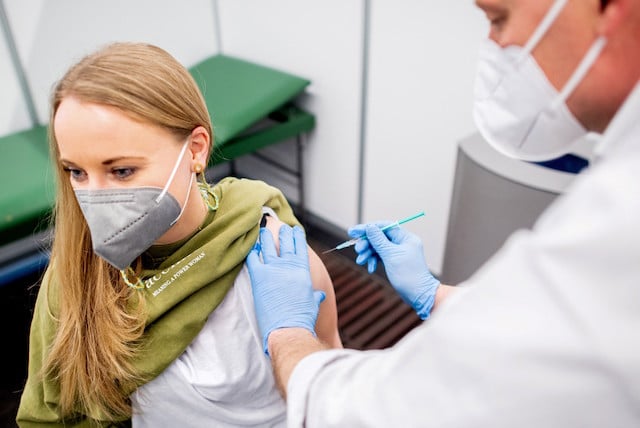The proposal is to be discussed at a meeting on Monday by Chancellor Angela Merkel’s government and the powerful regional state premiers.
According to the draft text, it was a question not of awarding people with proven immunity any special privileges, but of “lifting curbs on their basic rights that are no longer justified”.
The debate comes as Germany is struggling to tame a third wave of coronavirus infections, and just 22 percent of Germans have had their first of two Covid-19 jabs.
Under the proposed relaxations, people who are fully vaccinated would no longer have to show a recent negative coronavirus test to enter certain shops, get a haircut or attend certain events.
They would also be exempt from quarantining after returning from abroad, unless they were coming from a country classed as a high-risk virus variant area such as India.
Rules on social distancing and mask-wearing would still apply to everyone. German politicians from across the political spectrum have come out in favour of giving vaccinated people more freedoms.
The German Ethics Council, which helped shape the country’s vaccine priority groups, said it was becoming harder to justify the restrictions in the face of growing evidence that those vaccinated no longer play a significant role in spreading the virus.
Giving the same treatment to people who test negative, are vaccinated or even those who can show they have recovered from Covid and allow them “to access restaurants or shops is ethically unproblematic”, council chair Alena Buyx told the Tagesspiegel daily on Sunday.
‘Emergency brake’
New nationwide legislation went into force on Saturday that imposes tougher restrictions in regions with more than 100 new infections per 100,000 residents over a seven-day period for three consecutive days, which currently includes huge swathes of Germany.
Merkel had pushed hard for the “emergency brake” rules to become legally binding after many regional leaders refused to take unpopular measures, despite rapidly rising case numbers.
READ ALSO: Germany’s new ’emergency brake’ Covid restrictions come into force Saturday
The new law includes a controversial 10pm-5am curfew and stricter rules for social gatherings and store openings. If the incidence rate climbs above 165, schools must revert to online lessons.
The legislation also explicitly allows for “exceptions to be granted to those considered immune”, Justice Minister Christine Lambrecht told the Handelsblatt business daily on Saturday.
Finance Minister Olaf Scholz, who is running to succeed Merkel in September’s general elections, said Germany should go even further and draw up plans for a phased reopening of the country as the vaccination pace picks up speed.
“By the end of May, we should be able to make reliable predictions. I want us, as a government, to commit to clear and brave steps towards reopening,” he told the Bild am Sonntag newspaper.
READ ALSO: EXPLAINED: Can I get the AstraZeneca vaccine in Germany if I’m not on a priority list?



 Please whitelist us to continue reading.
Please whitelist us to continue reading.
Member comments